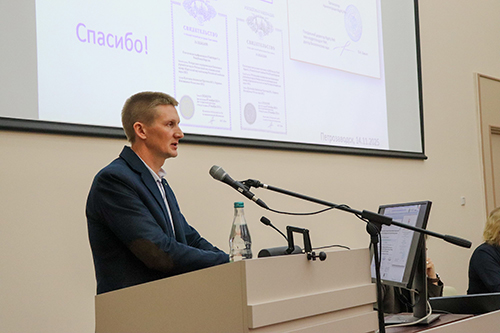News

November 26, 2025
KarRC RAS to run trials of Belarusian technologies for woody plant reproduction
KarRC RAS CEO Olga Bakhmet signed a cooperation agreement with the Belarusian Republican Forest Breeding and Seed Production Center (RBSPC). Karelian Research Centre RAS will be a base for trying out Belarusian technologies for reproduction of woody plants in a northern environment.
KarRC RAS CEO Olga Bakhmet signed a cooperation agreement with the Belarusian Republican Forest Breeding and Seed Production Center (RBSPC). Karelian Research Centre RAS will be a base for trying out Belarusian technologies for reproduction of woody plants in a northern environment.

November 24, 2025
Breams infected with ligula worms are edible
Biochemists and parasitologists at KarRC RAS studied how the wellbeing and nutritive value of the bream is affected by ligula – a flatworm that can grow to be several times as long as the host fish. To this end, scientists checked a number of crucial parameters in healthy and ligula-infected fish from Lake Syamozero. Analyses show that this parasite, non-hazardous for humans, does not have much effect on the quality of the fish either.
Biochemists and parasitologists at KarRC RAS studied how the wellbeing and nutritive value of the bream is affected by ligula – a flatworm that can grow to be several times as long as the host fish. To this end, scientists checked a number of crucial parameters in healthy and ligula-infected fish from Lake Syamozero. Analyses show that this parasite, non-hazardous for humans, does not have much effect on the quality of the fish either.

November 21, 2025
Karelian Research Centre RAS to organize and host water research school for young CIS scientists
Karelian Research Centre RAS in collaboration with the North-Center Association is organizing the international school “Under the Pressure of Global Climate Change: A Youth Network for Water Ecosystem Research”, which will be attended by young CIS researchers. The project is among the winners of the grant competition of the Gorchakov Public Diplomacy Fund.
Karelian Research Centre RAS in collaboration with the North-Center Association is organizing the international school “Under the Pressure of Global Climate Change: A Youth Network for Water Ecosystem Research”, which will be attended by young CIS researchers. The project is among the winners of the grant competition of the Gorchakov Public Diplomacy Fund.

November 18, 2025
Karelian Minister of Agriculture and Fisheries Olga Palkina appraised the scientific potential of KarRC RAS in agro- and biotechnologies
Minister of Agriculture and Fisheries of the Republic of Karelia Olga Palkina visited the research units of the KarRC RAS DMR in Vilga: Vilga Laboratory of Agricultural Technologies, Plant Biotechnology Laboratory, and Laboratory for Monitoring Greenhouse Gases. Scientists there conduct research in priority areas of strategic importance for the region's agriculture.
Minister of Agriculture and Fisheries of the Republic of Karelia Olga Palkina visited the research units of the KarRC RAS DMR in Vilga: Vilga Laboratory of Agricultural Technologies, Plant Biotechnology Laboratory, and Laboratory for Monitoring Greenhouse Gases. Scientists there conduct research in priority areas of strategic importance for the region's agriculture.

November 14, 2025
Karelian zoologists find out how the wolf population maintains its viability in the current situation
KarRC RAS Learned Council had a meeting on November 14. Is opened with a ceremony of handing awards from the Russian Ministry of Science and Higher Education, RAS, and Head of the Republic of Karelia to researchers. The scientific agenda was a presentation on changes in the wolf population genetic structure in response to growing hunting delivered by Head of Zoology Laboratory, Institute of Biology KarRC RAS, Konstantin Tirronen.
KarRC RAS Learned Council had a meeting on November 14. Is opened with a ceremony of handing awards from the Russian Ministry of Science and Higher Education, RAS, and Head of the Republic of Karelia to researchers. The scientific agenda was a presentation on changes in the wolf population genetic structure in response to growing hunting delivered by Head of Zoology Laboratory, Institute of Biology KarRC RAS, Konstantin Tirronen.

November 14, 2025
PORA and Karelian Research Centre RAS signed a cooperation agreement
On November 14, Karelian Research Centre of the Russian Academy of Sciences and Project Office for Arctic Development (PORA) signed in Petrozavodsk a Strategic Partnership Agreement. The document was undersigned by PORA Director General Maxim Dankin and KarRC RAS Acting Director General Olga Bakhmet.
On November 14, Karelian Research Centre of the Russian Academy of Sciences and Project Office for Arctic Development (PORA) signed in Petrozavodsk a Strategic Partnership Agreement. The document was undersigned by PORA Director General Maxim Dankin and KarRC RAS Acting Director General Olga Bakhmet.



